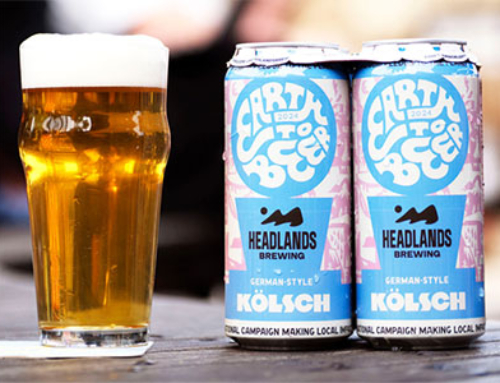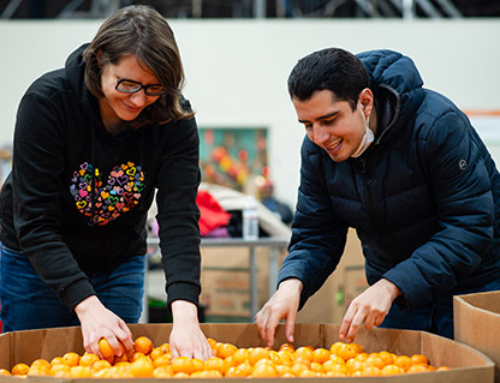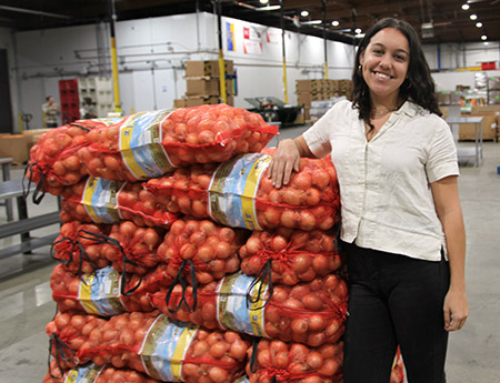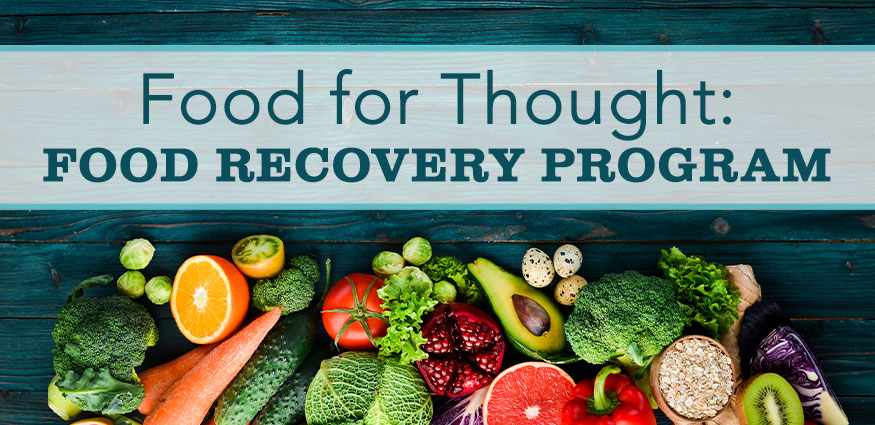
In this month’s Food for Thought blog we dive into the wild world of our Food Recovery Program (FRP)! Our program connects retailers, who have excess food, with our partner organizations in the community, to make sure food is eaten and not wasted.
Before we dig into FRP let’s step back and look at how ACCFB sources and distributes food across Alameda County and about the problem of food waste.
Food: Where does it all come from?
You might imagine ACCFB as a food pantry, where individuals and families can pick up food directly. The reality is that most Food Banks like ours operate on the county scale and act as an aggregation center for food redistribution. That means that we function more like a wholesaler that serves as a “one-stop-shop” for direct service organizations (including but not limited to food pantries, community centers, churches, soup kitchens, transitional housing, mobile food pantries, schools, etc.) to source food.
This model allows smaller organizations to focus on reaching folks directly and not have to worry about sourcing. It’s more efficient, both logistically and economically, to have one entity like ACCFB with bulk buying power and transportation resources to redistribute food.
What about food waste?
According to the USDA, “In the United States, food waste is estimated at between 30-40 percent of the food supply.” It is clearly a significant problem that perfectly good food goes to waste, especially knowing that 1 in 4 Alameda County residents is at risk of or experiencing hunger.
That’s why we launched our Food Recovery Program (FRP) back in 2012. When it comes to healthy food, we believe it should be eaten – not wasted.
FRP provides retailers (like Safeway, Costco, smaller local stores like Berkeley Bowl, and more!) an outlet for surplus food while leveraging ACCFB’s network and transportation resources to ensure that our partner organizations (like East Oakland Senior Center and Shiloh Mercy House), have access to the food in their own communities. Many of these organizations are run by a small but mighty group of dedicated staff or volunteers. They focus on providing food and services directly to community members, so they don’t always have the time, vehicles, or human power to pick up food donations at every store in their neighborhood.
That’s where we come in! Our wonderful driver Noe (soon to be one of two drivers!) visits participating retailers to collect surplus food and take it directly to partner organizations, where the food is weighed and then distributed. Since it launched, our FRP has provided the equivalent of more than 26 million meals!
Gearing up for SB 1383
Food waste is also an environmental issue. It might be surprising to see our mission to end hunger as part of fighting climate change, but the truth is that food banks are key partners in reducing the emission of greenhouse gasses. We estimate the food we redirect to neighbors’ tables through FRP will have the environmental impact of taking 1,000 cars off Bay Area roads each year.
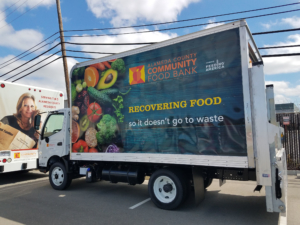 Last year, we added our first hybrid FRP truck to the ACCFB fleet with funding from CalRecycle, secured by Waste Management of Alameda County. And, this summer, we’re excited to launch a second hybrid truck to continue this critical work!
Last year, we added our first hybrid FRP truck to the ACCFB fleet with funding from CalRecycle, secured by Waste Management of Alameda County. And, this summer, we’re excited to launch a second hybrid truck to continue this critical work!
“The brilliance of this truck is that it will help the Food Bank recover 1 million more pounds a year, so that food can feed people rather than polluting the air,” Sen. Nancy Skinner said during a ceremony at ACCFB. “This is an incredible day to enhance food security and help our climate pollution problem.”
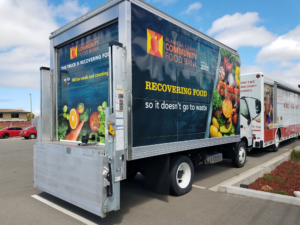 These two trucks will allow us to extend the program from 3 to 5 days a week! The expansion comes ahead of the implementation of California State Senate Bill 1383, an organic waste bill that covers all aspects of way we manage waste in the State of California. SB 1383 establishes a 75 percent reduction of organic waste ending up in landfills by 2025 – and an additional target of at least 20 percent reduction of edible food waste to be rescued for consumption instead.
These two trucks will allow us to extend the program from 3 to 5 days a week! The expansion comes ahead of the implementation of California State Senate Bill 1383, an organic waste bill that covers all aspects of way we manage waste in the State of California. SB 1383 establishes a 75 percent reduction of organic waste ending up in landfills by 2025 – and an additional target of at least 20 percent reduction of edible food waste to be rescued for consumption instead.
Phase 1 of SB 1383 starts in 2022 and focuses on “Tier 1 Food Generators” like large-scale supermarkets, distributors, and wholesalers. In January of next year, these businesses will be inspected and fined if they aren’t diverting food waste from landfills. This presents a huge opportunity for ACCFB to help our partners to absorb this surplus and get it out to folks across Alameda County quickly.
So…What’s Next?
Our work isn’t over!
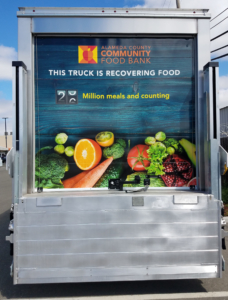 Our Sustainability Program team oversees the FRP, and includes Xochi Hernandez, Emery Webster, Noe Juarez and Eyra Gonzalez. This dedicated group is working to shift some of the FRP’s administrative work so partner organizations can focus on their programs and distribution. Additionally, the team is in the process of connecting with smaller retailers specializing in food from different regions to increase access to food that is as culturally diverse as Alameda County. The Sustainability Team is also working with our Regional Partnerships Team to identify any roadblocks keeping smaller organizations from joining the FRP and support them with resources so they can take part.
Our Sustainability Program team oversees the FRP, and includes Xochi Hernandez, Emery Webster, Noe Juarez and Eyra Gonzalez. This dedicated group is working to shift some of the FRP’s administrative work so partner organizations can focus on their programs and distribution. Additionally, the team is in the process of connecting with smaller retailers specializing in food from different regions to increase access to food that is as culturally diverse as Alameda County. The Sustainability Team is also working with our Regional Partnerships Team to identify any roadblocks keeping smaller organizations from joining the FRP and support them with resources so they can take part.
There is no simple way to end hunger in Alameda County, but food rescue is a key part to the solution. By diverting food that would otherwise be wasted, and thus reducing the environmental impact of food in our landfills, we can both feed and protect our community. Keep an eye out for our trucks in your neighborhood and stay tuned for more updates!

